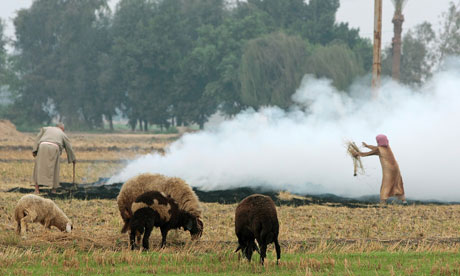Egypt's landless have no love for Mubarak
The president acquiesed a phase-out of the 1952 land reform, forcing millions of people off 'their' land

All this is true. But it is also true and important that Egypt is still a rural society. More than half (57%) of Egyptians live in the countryside. And in the countryside, President Hosni Mubarak's track record with regard to empowering his subjects is abysmal.
Under Mubarak's watch, one in ten Egyptians lost their farms. Almost two decades ago, families who had been self-sustaining farmers became landless sharecroppers or migrant labourers with a stroke of Mubarak's pen.
The history books are punctuated by the grievances of those who lack secure and stable rights to land. They have sparked many of the civil upheavals of the past hundred years, such as the ones that brought revolutionary regimes to power in Russia in 1917 and China in 1949. And a special and poignant sub-class of these conflicts (including the Mexican revolution and the Algerian war of independence) involved the grievances of those who thought they had secure rights to land only to have that land snatched away with the connivance of the regime in power.
And that's just what happened in Mubarak's Egypt. In 1952, Egypt went from one authoritarian regime to another – from a corrupt monarchy to a military regime. At the time, land ownership was highly centralised. Forty-four percent of rural inhabitants were landless. And the top 1% of the population owned more than one-third of the land.
In that overwhelmingly agrarian society, the first and most important economic reform carried out by the new regime was the 1952 land reform: some of the landless poor became full landowners, but the biggest part of the reform was the creation of "registered tenancy", which gave the large population of insecure sharecroppers perpetually secure rights to the land they were farming, with much lower, fixed rent payments. If the land was sold by the owner for non-agricultural purposes, the registered tenant was to receive half the proceeds.
For most practical purposes, the registered tenants, from that time onward, functioned as though they were the owners of the lands they farmed. And so things continued, through the successor regime of Anwar Sadat, and into that of Mubarak. Meanwhile, most of the landlords moved to the cities and developed other sources of income.
When Landesa (then called the Rural Development Institute) carried out fieldwork in Egypt in the 1980s, we urged the then minister of agriculture Youssef Wally that the government should buy out the landlords and confer full, formal ownership on the registered tenants.
We feared the old owners might, at some time, gain the capacity to reverse the reform, even decades later. But we found no support in the Mubarak government.
Soon, our fears came to pass. In 1992, with little fanfare, and Mubarak's acquiescence, the legislature adopted a five-year phase-out of the registered tenancy provisions of the land-reform law, beginning with an immediate tripling of rent. By 1997, tenants would once again be as they had been under the old monarchy: they could be evicted at the landlord's pleasure, and were subject to any rent the landlord wished to charge.
Between 1992 and 1997, that is precisely what happened. About 1 million heads of tenant households (about 6 million people, or close to one in ten Egyptians) went from being secure, moderately prosperous farmers, who enjoyed owner-like status and paid a low fixed rent, to being traditional insecure sharecroppers.
Subsequent research by specialists in Egyptian agriculture found that this policy reversal caused widespread eviction of former registered tenants, increased rural poverty and indebtedness, and spurred an increase in urban migration by the young. Average rents eventually quadrupled.
Like their city cousins, Egypt's rural landless see no way to improve their lives, save for one – bring down the man who took their land and their livelihood: Mubarak.
Roy Prosterman is founder and chairman emeritus of Landesa/Rural Development Institute, and emeritus professor of law at the University of Washington, Seattle
This comment has been removed by a blog administrator.
ReplyDelete